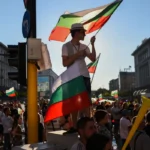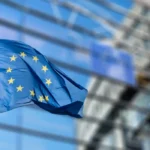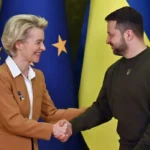As concerns about the humanitarian situation in the Gaza Strip grow, Israeli Prime Minister Benjamin Netanyahu announced a major offensive against the town of Rafah, on the border with Egypt. Faced with this catastrophic situation, the European Union is still struggling to adopt a unanimous position.
Faced with the deterioration of the humanitarian situation in Gaza, Europe speaks (almost) with one voice
The announcement of this offensive in the south of the Gaza Strip has caused serious concern in Europe and around the world. This Monday, February 19, 26 of the 27 Member States agreed on the request for a humanitarian pause in Gaza and opposed the launch of a new offensive on the city of Rafah, only Hungary refused to ally with these statements. Spain and Ireland, which have been very critical of the actions of the Israeli government in terms of human rights, have called on the Commission to ensure that Israel respects humanitarian law. Spanish Prime Minister Pedro Sanchez and his Irish counterpart Leo Varadkar are taking advantage of the association agreement that has existed between the European Union and the Jewish state for more than 20 years to justify such a request to the Commission. Indeed, this agreement constitutes the cornerstone of relations between the Union and Israel, it stipulates an obligation to respect human rights. Failure to comply with this obligation could disrupt this bilateral relationship, and the Commission’s response is therefore all the more awaited.
The two States recall in their letter that they do not question Israel’s “right to defend itself”, a right enshrined in international law and put forward by the Israeli government as the main justification for its attacks. However, they affirm that the humanitarian catastrophe currently taking place in the Gaza Strip reflects a possible non-compliance by the Jewish State with its obligations in terms of humanitarian law.
Although the 27 do not agree on the solution to adopt to end the conflict, they seem to find common ground on the need to protect civilian populations and stem the ongoing humanitarian catastrophe. Germany, which has firmly defended Israel’s right to defend itself and which, in the aftermath of the October attacks, rejected calls for an immediate ceasefire, condemned this new Israeli offensive. Foreign Minister Annalena Baerbock spoke on X, recalling that such an offensive in Rafah would be a “humanitarian catastrophe”. As the German Minister recalled, 1.3 million Palestinian civilians are confined in the city of Rafah, which is prey to Israeli bombing.
Negotiations in Brussels: an unfruitful meeting
A few weeks before the announcement of this new Israeli offensive in the Gaza Strip, the heads of Israeli and Palestinian diplomacy met, separately, with the 27 to discuss a solution to the crisis. The regional mediators of the conflict, Saudi Arabia, Egypt and Jordan, were also present during this meeting. At this stage of the conflict, this meeting gave little hope for the outcome of the negotiations. By deciding to address subjects entirely other than the search for a peace plan, the attitude of the Israeli Minister of Foreign Affairs confirmed this omen. He informed the 27 of his projects for “artificial islands off the coast of Gaza” and “rail links with India” according to the head of European diplomacy, Josep Borrell, who did not hide his disappointment faced with these statements which he considers irrelevant. The head of European diplomacy gave the three priorities which are, according to him, essential to ending the conflict: Avoiding the regionalization of the conflict in Lebanon, mitigating the catastrophic situation in the Gaza Strip and opening the way to a peaceful settlement disputes.
Apart from the European Union, it seems that the international community has very little influence over the negotiations and the development of a process to end the conflict. The resolution adopted by the United Nations General Assembly in December, although non-binding, reflected the demand of many states for a humanitarian ceasefire in Gaza. This resolution has already faced three vetoes from the United States during its vote in the Security Council, so it could not benefit from a mandatory character, making it obsolete in the face of the Israeli government which is little concerned with the symbolic character. resolutions of the United Nations General Assembly.
The Union is, however, a leading economic player in the region. Israel’s first economic partner and first donor of aid to Palestine, it has clearly failed to demonstrate a diplomatic weight commensurate with its economic weight in the region, or, as Nathan Brown puts it more simply and Dimitri Bouris “the conflict seems to involve a lot of euros, but very little Europe”. This importance of economic relations between the Union and the Middle East is not new. The first agreements embodying these relations came from the Barcelona process established in 1995 and which created an economic cooperation mechanism between the European Union, the Maghreb and the Middle East of which the Palestinian Authority and Israel are part. This economic involvement of the Union did not make it possible to create a space for negotiations for the great conflict in the region. However, the Israeli-Palestinian conflict had a significant influence on the failure of the Barcelona process; according to historian Maria Giannious, there is an interdependence between the peace process and Euro-Mediterranean cooperation.
The Union’s inability to speak with one voice in the face of this conflict is the main reason for its limited influence in the conflict exit negotiations. Its initial positions on the issue have hardly evolved since the Venice Declaration which dates from 1980. In this declaration, the European Communities affirm, on the one hand, the right to self-determination of the Palestinian people and, on the other hand, on the other hand, Israel’s right to security. Although since that time, the situation in the Middle East has evolved, the solutions proposed by the head of European diplomacy remain largely similar.
If the Member States have divergent positions on the solutions to adopt, the faces of the European Union embodied by Josep Borrell, High Representative of the Union for Foreign Affairs, and Ursula Von der Leyen, President of the Commission, -themselves do not agree on their points of view regarding this situation. As a reminder, in reaction to the attacks of October 7 perpetrated by Hamas on Israeli territory, the President of the European Commission made statements which aroused tensions with the head of European diplomacy Josep Borrell as well as the President of the Council Charles Michel, notably failing to remind the State of Israel of its obligation to respect international humanitarian law.
This article is originally published on taurillon.org






